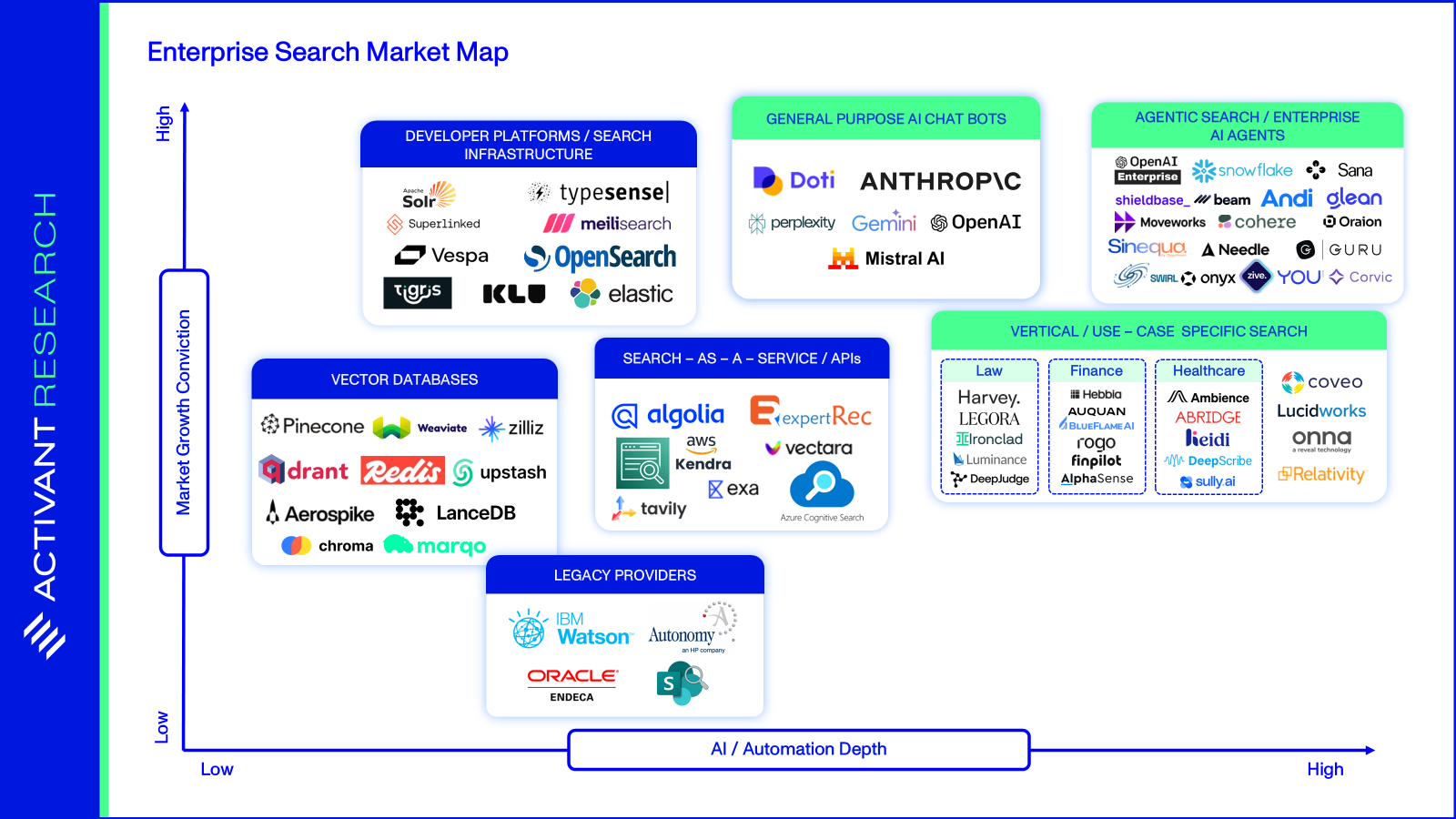- Activant's Greene Street Observer
- Posts
- Enterprise Search Is Entering a New Era
Enterprise Search Is Entering a New Era
A shift to systems of intelligence

Introduction
Google gives us an impeccably organized view of the entire internet. Type a query, and the most relevant page appears instantly. Inside a company, however, search often degrades into: “Which folder did I bury that in?” It’s a familiar headache. Now, a new wave of AI-driven search tools is bringing Google-like relevance and speed to our internal knowledge stores.
As AI becomes central to knowledge work, enterprise search is emerging as a critical foundation. Knowledge workers depend on vast unstructured data–across emails, documents, and chats–that traditional search can't handle. Large language models (LLMs) enable smarter, context-aware discovery, but rely on enterprise search to access and retrieve relevant internal information. Without it, even the best AI operates in a vacuum, disconnected from the knowledge that drives decisions. Enterprise search has expanded beyond internal file systems to include custom applications, infrastructure, and third-party tools. This new era of information retrieval brings deeper intelligence, reasoning, memory, and agentic research capabilities, enabling smarter, more contextual discovery across a broader data landscape.
At Activant, we believe that enterprise search could potentially be a game-changer. In line with our work on systems of intelligence, we hold a strong conviction that if all work begins at the enterprise search platform, which centralizes data and systems, it has the potential to become the AI-era “operating system” for the modern enterprise.
But we’re not there yet. With 79% of employees dissatisfied with internal search functions, the need for enterprise search tools that actually deliver is undeniable. As companies adopt more SaaS tools (Slack, Notion, Salesforce, Asana, Google Workspace, etc.), information becomes increasingly siloed. As a result, employees spend an average of 1.8 hours a day, or 9.3 hours per week, searching for and gathering information. That’s nearly 25% of 40-hour work week lost to inefficiency!
Additionally, horizontal enterprise search solutions have struggled to differentiate meaningfully and often deliver similar generic search experiences across industries and roles. This has caused several early players to rethink their approach. Genspark, for example, publicly scrapped its initial AI search product due to a lack of real traction or unique value. Similarly, Glean, once positioned as an enterprise search engine, has pivoted toward becoming more of an AI workflow and agent builder, with search as a foundational layer rather than the core product. These shifts reflect a broader realization: search alone isn’t enough. Successful tools must deliver role-specific utility, context-awareness, and actionability to stand out.
The new “search war” reveals a deeper paradigm shift: the convergence of external and internal search. Users increasingly expect AI search to not only summarize several sources, but also to intelligently cross-check findings across internal and external sources into decision-ready intelligence. As internal search becomes a standard feature in enterprise platforms and search monetization models evolve, fundamental questions arise about the web's infrastructure, originally built on clicks, ads, and content distribution. The agent-native search and agentic web era may be closer than we think.
Playing Catch Up
You can think of enterprise search as a tool that lets employees find information across all company data sources, like documents, emails, and databases, through one single, unified search interface. Enterprise search isn’t new–these tools have been around since the early 2000s. However, their evolution in recent years has been asymptotic, continually approaching but never quite reaching the level of accuracy and usability that's really needed.
The timeline below highlights key technological changes and the relevant impact on the enterprise search industry. It’s no secret that enterprise search has failed in the past to deliver against expectations. Early enterprise search solutions were primarily focused on keyword-based searching which often yielded inconsistent results and required manual tuning to improve relevance. However, recent advancements in natural language processing (NLP), machine learning (ML), and artificial intelligence (AI) are improving the capabilities of enterprise search systems. These modern solutions infer user intent and interpret complex queries to deliver accurate, real-time search results. This enhances user experience and drives greater adoption within organizations.

